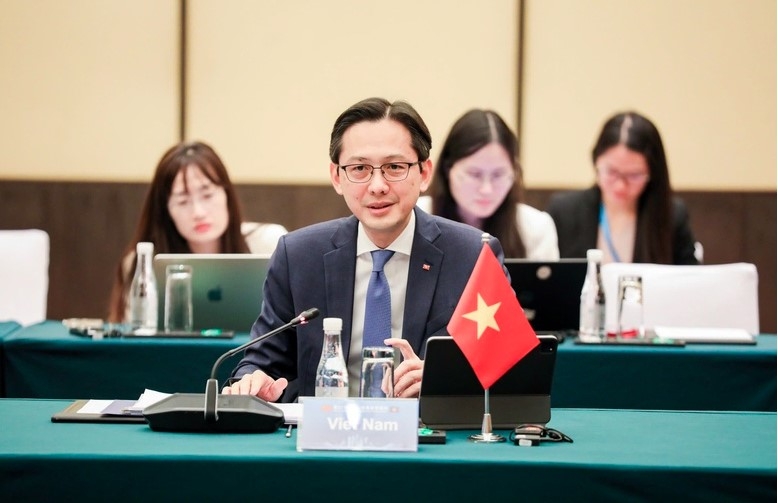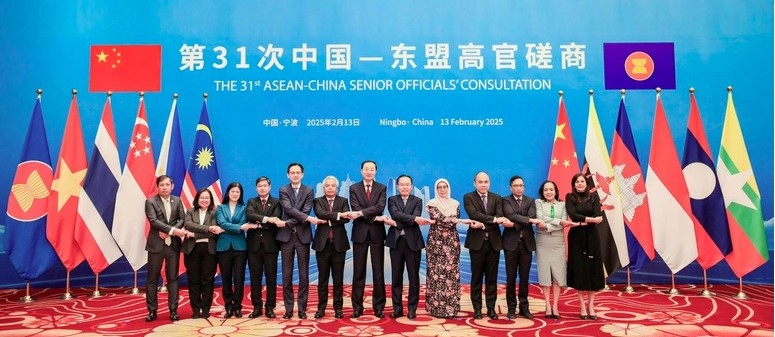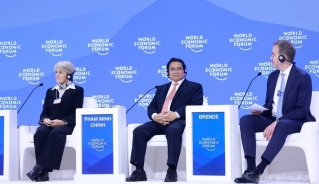Vietnam urges stronger ASEAN – China cooperation amid regional complexities
VOV.VN - Deputy Foreign Minister Do Hung Viet has underlined the need to sustain ASEAN – China cooperation momentum amid growing regional complexities, calling for concrete actions to strengthen political trust, security collaboration, and responses to emerging challenges.

A Vietnamese delegation led by Deputy Foreign Minister Do Hung Viet attended the 31st ASEAN – China Senior Officials' Consultation in Ningbo, Zhejiang province, China, on February 12–13.
The meeting, part of the annual dialogue series between ASEAN and its partners, aimed to review cooperation progress, set future directions, and prepare for the ASEAN Summit and ASEAN foreign ministers' meetings in the latter half of 2025.
Participants underscored the significance of the ASEAN – China Comprehensive Strategic Partnership for both sides and the broader region.
Speaking on behalf of ASEAN regarding political and security cooperation, Viet highlighted this as a key pillar of ASEAN – China relations. Over the years, both sides have maintained robust dialogue, strengthened mutual trust, and worked toward a shared vision of peace, security, and development.
In the face of an evolving strategic landscape with potential complexities and uncertainties, he called for sustained cooperation momentum. He urged China to remain actively engaged in ASEAN-led mechanisms and collaborate with the bloc to uphold standards of conduct.
Dealing with the rise of non-traditional security threats, the Vietnamese diplomat outlined three key cooperation priorities: ensuring the concrete and practical implementation of agreements made by both sides' leaders, strengthening responses to emerging challenges such as cybercrime, transnational crime, and online scams, and expanding sub-regional collaboration, particularly in the Mekong sub-region, to tackle water security, sustainable water resource management, and climate change.
On this occasion, Viet announced that Vietnam would host the signing ceremony of the United Nations Convention against Cybercrime and expressed hope that countries would soon finalize internal procedures to participate in the event in Hanoi.
Reaffirming ASEAN’s consistent stance on the East Sea, he welcomed recent progress in negotiations on a code of conduct (COC) in the East Sea and encouraged both sides to push for further breakthroughs. He stressed the importance of self-restraint and avoiding actions that could complicate the situation, reinforcing the common goal of peace, security, safety, and stability in the East Sea.

China’s Vice Foreign Minister Sun Weidong reaffirmed that ASEAN remains a priority in his nation’s neighborhood policy. He pledged Beijing’s support for ASEAN’s community-building efforts and its role as a united, independent, and strategically autonomous player at the center of regional affairs. With positive developments across multiple fronts, he noted that ASEAN – China ties stand among the most dynamic, substantive, and effective partnerships.
Since 2020, ASEAN and China have been each other’s largest trading partners. Delegates expressed hope for the early conclusion of negotiations on the ASEAN – China Free Trade Area (ACFTA) Version 3.0 and the effective implementation of the Regional Comprehensive Economic Partnership (RCEP).
ASEAN’s key cooperation frameworks, including the ASEAN Digital Economy Framework Agreement, the ASEAN Strategy for Carbon Neutrality, and the ASEAN Power Grid, are expected to open new avenues for collaboration with China, particularly in green, sustainable, and smart development. Digital transformation, innovation, emerging technologies such as 5G, artificial intelligence, and generative AI, as well as electric vehicles, supply chain resilience, and smart agriculture, are among the top priorities for optimizing future cooperation.
Building on the successes of 2024, the two sides agreed to further enhance cooperation in 2025, designated as the ASEAN – China Year of People-to-People Exchanges. This initiative aims to strengthen connectivity, boost friendships, and deepen mutual understanding between ASEAN and China.
The meeting also included discussions on regional and global developments, including major power relations, the East Sea, the Middle East, and Myanmar.
Amid a shifting and unpredictable geopolitical landscape, participants stressed the need to uphold the principles of the UN Charter, promote multilateral values, and build an open, inclusive, and rules-based regional architecture with ASEAN at its core. They also underscored the importance of contributing positively and responsibly to peace, cooperation, and security.
On the sidelines, Deputy Minister Viet met with his Chinese counterpart Sun Weidong to discuss bilateral relations and coordination within multilateral forums such as ASEAN and the UN.



